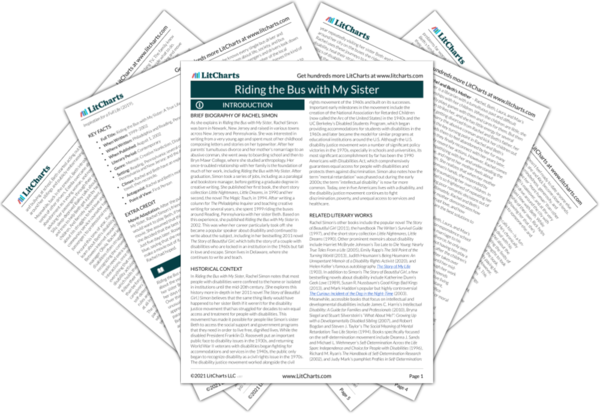Tim Quotes in Riding the Bus with My Sister
“Yeah,” she says with a quick nod. “He’s cool.”
Ah, yes. Cool. As my speech might sometimes seem unintelligible to Beth, so can hers seem to me, because Beth has her own lingo. And in Beth-speak, as I have gathered from her letters, “cool” does not concern hip attire or trendy indifference. Instead, it is the term of highest approval, bestowed only upon those people Beth deems worthy of her attention and trust, and crucial if one is to be promoted into her personal Top Ten (though, in truth, hip-hop shades or chiseled Brad Pitt features—neither of which the Professor possesses—are apt to increase the likelihood of admission). “Yes,” I say. “I guess I do mean he’s cool.”
“Every day right here in this seat, I have history riding with me.
And that’s what I like about it. There’s so much richness on a bus—really, so much richness everywhere—if you just develop the ability to look at life with a different eye, and appreciate the opportunities offered to you.”
Beth has sought out mentors in places where others might not look, and, moreover, taken the time, and endured the pain, to weed out those drivers who are decent and kind and reflective from those who are indifferent or hostile. The ones I’m meeting are, I realize as I quickly do the math, only about a sixth of the whole bus company. That took Beth a huge amount of trial and error—and, yes, determination. I shake my head, amazed at how much I’d somehow missed, and then, with a surge of optimism, wonder if one out of six people in any profession or community would also be exceptionally thoughtful. How could I really know? Have I ever spent this much time exploring the worldviews of my colleagues at school or the bookstore? Do I have a clue about whether my neighbors feel committed to the Golden Rule?
There is just enough sun left for me to make out a silvery bus, moving like a fish, winding between the curbs. Maybe a bus where my sister sits. […] To the east, there’s another, and another, and another. Each one its own private history class, or luncheonette, or quilting bee, or schoolroom, or comedy theater—yet each one linked, one person at a time, to all the others. Because I can see, as Rick points it out, how they glide along, stopping for riders—riders who might have been on that run last year and are now over here, and riders from over here who might be transferring to a bus over there—and how the journeys seem separate, yet are constantly and inextricably joined together. I step back and take in all the buses coasting and turning and stopping and going—the enormous web of the world.

Tim Quotes in Riding the Bus with My Sister
“Yeah,” she says with a quick nod. “He’s cool.”
Ah, yes. Cool. As my speech might sometimes seem unintelligible to Beth, so can hers seem to me, because Beth has her own lingo. And in Beth-speak, as I have gathered from her letters, “cool” does not concern hip attire or trendy indifference. Instead, it is the term of highest approval, bestowed only upon those people Beth deems worthy of her attention and trust, and crucial if one is to be promoted into her personal Top Ten (though, in truth, hip-hop shades or chiseled Brad Pitt features—neither of which the Professor possesses—are apt to increase the likelihood of admission). “Yes,” I say. “I guess I do mean he’s cool.”
“Every day right here in this seat, I have history riding with me.
And that’s what I like about it. There’s so much richness on a bus—really, so much richness everywhere—if you just develop the ability to look at life with a different eye, and appreciate the opportunities offered to you.”
Beth has sought out mentors in places where others might not look, and, moreover, taken the time, and endured the pain, to weed out those drivers who are decent and kind and reflective from those who are indifferent or hostile. The ones I’m meeting are, I realize as I quickly do the math, only about a sixth of the whole bus company. That took Beth a huge amount of trial and error—and, yes, determination. I shake my head, amazed at how much I’d somehow missed, and then, with a surge of optimism, wonder if one out of six people in any profession or community would also be exceptionally thoughtful. How could I really know? Have I ever spent this much time exploring the worldviews of my colleagues at school or the bookstore? Do I have a clue about whether my neighbors feel committed to the Golden Rule?
There is just enough sun left for me to make out a silvery bus, moving like a fish, winding between the curbs. Maybe a bus where my sister sits. […] To the east, there’s another, and another, and another. Each one its own private history class, or luncheonette, or quilting bee, or schoolroom, or comedy theater—yet each one linked, one person at a time, to all the others. Because I can see, as Rick points it out, how they glide along, stopping for riders—riders who might have been on that run last year and are now over here, and riders from over here who might be transferring to a bus over there—and how the journeys seem separate, yet are constantly and inextricably joined together. I step back and take in all the buses coasting and turning and stopping and going—the enormous web of the world.











